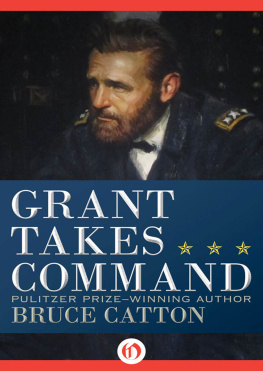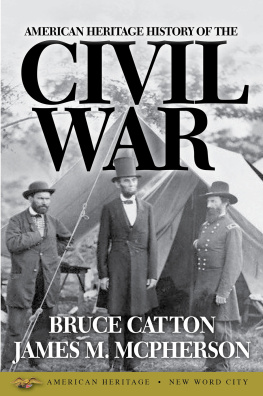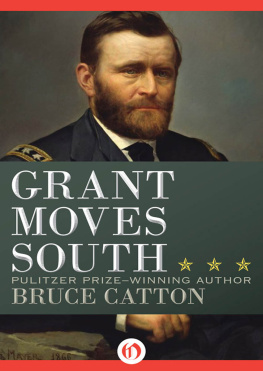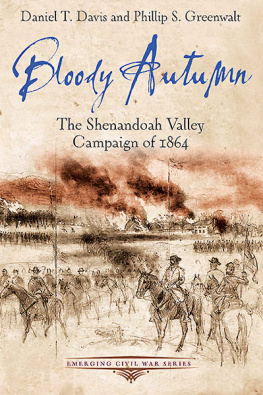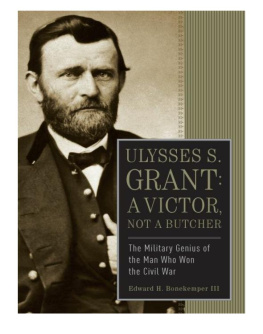Grant Takes Command
Bruce Catton

For David
Contents
List of Maps
Foreword
After the capture of Vicksburg on July 3, 1863, Grants army starts a period of occupation, absorbing its conquest of the Mississippi valley. In the east, the Army of the Potomac rests after its great victory at Gettysburg. In central Tennessee, the Federal Army of the Cumberland is moving to drive Confederate forces back into Georgia. The Federal government in Washington, sensing a turning point in the war, starts to cast about for the best path to final victory. As the authorities begin this task, they realize that their most successful soldier is the one they know least about.
CHAPTER ONE
Political Innocent
Officially, John A. Rawlins went to Washington to carry dispatches telling how Vicksburg had been won. To be sure, the great victory spoke for itself so plainly that the written tale did not make much difference; but if the victory was clear the man who had won it was not. In this summer of 1863, Washington was more interested in Ulysses S. Grant than in any other man alive, but it knew very little about him. Except for a few people like Major General Henry W. Halleck, the General-in-Chief, and the industrious Illinois Congressman Elihu Washburne, hardly anyone had so much as set eyes on him. It was time to get him into better focus, and if Grant could not be present in person it would be worthwhile to talk to his right-hand man.
Rawlins got a warm reception. He reached Washington on July 30, went first to the War Department to talk with Halleck and with Hallecks assistant adjutant general, Colonel J. C. Kelton, and he wrote happily to Grant: It is worth a trip here to see how delighted they are over your success. There is nothing left undone by them to make me feel that I am here properly. They were impatient, said Rawlins, only because Grant had not yet told them which of his subordinates he wanted to have promoted; the implication being that any favors Grant asked for would be done. Rawlins also reported that Halleck heartily endorsed, as being proper as well as wise, the surrender terms by which Grants 31,000 Confederate prisoners had been released on parolea matter on which Halleck earlier had been somewhat critical. After this pleasant meeting Rawlins went to the White House to see the President and the cabinet. To President Lincoln Rawlins presented the following letter:
S IR : the bearer of this, Lieut. Col. John A. Rawlins, is the assistant adjutant-general of the Army of the Tennessee. Colonel Rawlins has been connected with this army and with me in every engagement from the battle of Belmont to the surrender of Vicksburg. Colonel Rawlins goes to Washington now by my order as bearer of the reports of the campaign just ended, and rolls and paroles of prisoners captured. I would be pleased if you could give Colonel Rawlins an interview, and I know in asking this you will feel relieved when I tell you he has not a favor to ask for himself or any other living being. Even in my position it is a great luxury to meet a gentleman who has no ax to grind, and I can appreciate that it is infinitely more so in yours.
I have the honor to be, very respectfully, your obedient servant,
U. S. G RANT
President and cabinet members were favorably impressed. By this time they had met a great many officers from the staffs of commanding generals, but they had not yet seen anyone quite like Rawlins. He was pale, the pallor made more striking by his burning eyes and his luxuriant dark beard; a profane ascetic Puritan whom the War Departments special observer of westerners, Charles A. Dana, characterized as a very industrious, conscientious man who never loses a moment and never gives himself any indulgence except swearing and scolding. (Grant once told a friend that he kept Rawlins on his staff to do my swearing for me.) Secretary of the Navy Gideon Welles, who tended to be suspicious of all army officers, confessed that he was much pleased with him, his frank, intelligent and interesting description of men and of army operations. Mr. Welles went on to say that he liked Rawlinss unpretending and unassuming manners and said that the unpolished and unrefined deportment of this earnest and sincere patriot and soldier pleased me more than that of almost any other officer whom I have ever met. Welles confessed that Rawlins was never at West Point and has had few educational advantages, but he said that Rawlins was a sincere friend of General Grant, who I think sent him here for a purpose.
Welles was right. In his march toward victory on the Mississippi Grant had put a heavy foot straight through one of Abraham Lincolns most delicate political deals: the maneuver by which the President, in the summer of 1862, had given Major General John A. McClernand of Illinois what amounted to a promise of top command in the Vicksburg campaign. During the winter, with Hallecks support, Grant had steadily cut McClernand down to size, making him a corps commander in Grants army rather than an independent commander
McClernand obviously was threatening to restate the old charge that General Grant now and then drank more than his situation required. But McClernand had to be obtuse as well as vengeful to suppose that at this late date the authorities would waste any time on this accusation. It had been said too often, and it meant too little, and anyway a review would simply confirm what everybody already knewthat Grant was the most successful of all Federal generals, a man who had captured two Confederate armies en bloc. It was most unlikely that Grants position could be shaken by anything McClernand might say about occasional deviations from strict sobriety. Still, a little fence-mending could do no harm. Grant after all had crushed a presidential favorite and upset a presidential program, and it might be just as well to make sure that the President understood what Grant had done and why he had done it. As Welles suspected, Rawlins had been sent for a purpose. It may be that General Grant was not the utter political innocent he is sometimes thought to have been.
Army command in the Civil War was no job for a political innocent, and the McClernand case illustrates the fact. McClernand was a dedicated War Democrat, and now and then the army needed such men no matter how badly they lacked military capacity; in this war a generals ability to win and keep the support of friendly civilians in his rear might actually outweigh his failure to deal with the armed foes in his front. Lincoln had given McClernand a special assignment, not because he supposed that he was an especially competent soldier but because McClernands political influence in the West would bring the army recruits and political support which it had to have if the Mississippi valley was to be won. McClernand had done precisely what President Lincoln hoped he would do. It is possible that Grant, who discarded the general after this particular and priceless contribution had been made, had likewise carried out the Presidents wishes.
Anyway, Rawlins was on hand to explain everything, and Welles thought he did it very well. He gave evidence about McClernand, said Welles, proving that he was an impracticable and unfit manthat he has not been subordinate and intelligent but has been an embarrassment, and instead of assisting has really been an obstruction to army movements and operations. Welles admitted that Rawlinss statements showed prejudice, but he felt that Rawlins did prove that there can hardly be a doubt McClernand is at fault, and Rawlins has been sent here by Grant to satisfy the President of the fact. In this I think he has succeeded.

